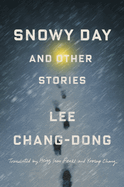
Before he became a revered film auteur, Lee Chang-dong was a teacher and writer who published his first short story, "War Trophy," in 1983. That and six additional stories compose his breathtaking first collection published for English-language readers in the U.S., Snowy Day and Other Stories, fluidly translated from the Korean by novelist and academic Heinz Insu Fenkl and Fenkl's former student, Yoosup Chang. Each of Lee's deeply introspective narratives moves between its characters' pasts and their present moments, repeatedly underscoring the consequential connections between the two, both personally and historically. Though some characters make monumental public gestures--protests, grandstanding, self-immolation--most of Lee's protagonists are just trying to survive.
Readers already familiar with Lee's uncanny ability to create precise yet multilayered film imagery will detect that impressive skill in these pages. In the titular story, about a young soldier enduring military conscription, the simple observation that "the snow has stopped falling" becomes rife with poignant meaning about historical consequences, failed connections, moments of inhumanity, and unbearable disappointment. In "Fire & Dust," a taxi driver responds, "It's only the precious kids who die" to news about the death of a student protestor, unaware that his passenger's young son died one year prior. The title of the story "There's a Lot of Shit in Nokcheon" is both observation and prophecy about an unexpected temporary reconciliation between estranged brothers.
Fenkl, in a translator's note, highlights the timelessness of Lee's "masterful" stories: they "come to us when we are experiencing our own volatile times." That recognition, that empathy, should turn aficionados of Lee's films into literary admirers, deservedly expanding his international presence. --Terry Hong

